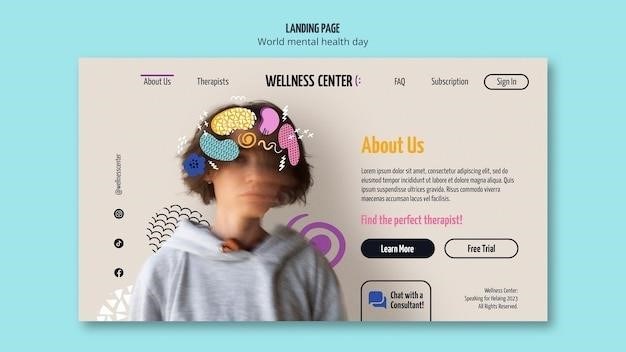Flow⁚ The Psychology of Optimal Experience
Mihaly Csikszentmihalyi’s groundbreaking work‚ “Flow⁚ The Psychology of Optimal Experience‚” explores the state of deep engagement and enjoyment. This book delves into the nature of happiness‚ examining how we achieve a fulfilling life. It investigates the conditions for flow‚ highlighting the balance between skill and challenge needed for optimal experience. The text also details the autotelic personality and how to cultivate flow in various life contexts.
Mihaly Csikszentmihalyi’s Key Concepts

Mihaly Csikszentmihalyi’s research centers on “flow‚” a state of complete absorption in an activity. His key concepts revolve around the interplay between skill and challenge. Optimal experience‚ or flow‚ arises when these are balanced; a task too easy leads to boredom‚ while one too difficult results in anxiety. Csikszentmihalyi emphasizes that flow isn’t merely pleasure; it’s a state of intrinsic motivation where the activity itself is rewarding. He also highlights the “autotelic personality‚” individuals naturally inclined towards flow experiences‚ readily seeking challenges and finding satisfaction in the process itself; His work further explores how flow contributes to happiness and meaning in life‚ transcending mere external rewards. The concept extends beyond leisure activities‚ encompassing work‚ relationships‚ and personal growth‚ offering a framework for a more fulfilling and purposeful life.
Defining Optimal Experience (Flow)
Mihaly Csikszentmihalyi defines optimal experience‚ or “flow‚” as a state of complete absorption in an activity. It’s characterized by a feeling of energized focus‚ full involvement‚ and enjoyment in the process of the activity. During flow‚ concerns about self vanish‚ and time seems to distort. There’s a clear set of goals‚ immediate feedback‚ and a sense of control. The challenge level matches the individual’s skill level‚ creating a perfect balance between difficulty and ability. This state isn’t merely about pleasure or relaxation; it’s a profound sense of accomplishment and intrinsic reward. The experience itself is inherently satisfying‚ driving further engagement. Flow differs from other positive experiences; it’s a state of intense focus and effortless action‚ a harmonious blend of challenge and skill leading to a heightened sense of well-being and personal growth.
The Conditions for Flow⁚ Skill vs. Challenge
Achieving flow hinges on a delicate balance between an individual’s skill level and the challenge presented by the task at hand. Csikszentmihalyi’s research indicates that flow is unlikely to occur if the challenge is too low (leading to boredom) or too high (resulting in anxiety). Optimal experience arises when the challenge perfectly matches one’s skills‚ creating a state of intense focus and effortless action. This “sweet spot” requires a high level of both skill and challenge; a low level of both results in apathy‚ while a high challenge with low skill leads to frustration and anxiety. The ideal scenario is a dynamic interplay where the challenge is just beyond one’s current capabilities‚ pushing for growth and improvement while remaining within the realm of possibility. This optimal balance fosters a deep sense of engagement and satisfaction‚ reinforcing the pursuit of further challenges and skill development.
Flow and Happiness⁚ An Internal State
Csikszentmihalyi’s research challenges the common misconception that happiness is solely dependent on external factors. His work posits that happiness‚ or rather‚ the experience of optimal experience (flow)‚ is fundamentally an internal state of being. It’s not derived from material possessions‚ social status‚ or external achievements‚ but rather from the quality of one’s engagement with an activity. Flow experiences‚ characterized by intense focus and a sense of effortless control‚ generate a feeling of profound satisfaction and well-being independent of external rewards. This internal state arises from the process itself‚ the complete absorption in the activity‚ rather than the outcome. Cultivating this internal state through activities that foster flow can significantly enhance overall happiness and life satisfaction‚ suggesting a shift from externally driven goals towards intrinsically rewarding experiences.
Autotelic Activities and the Flow State
Central to Csikszentmihalyi’s theory is the concept of autotelic activities. These are activities pursued for their inherent enjoyment‚ not for external rewards or pressures. The term “autotelic” literally means “self-goal‚” implying that the activity itself is its own reward. Engaging in autotelic activities is a crucial pathway to achieving the flow state. The intrinsic motivation inherent in these activities creates a natural balance between skill and challenge‚ fostering deep concentration and a sense of control. Examples of autotelic activities are diverse‚ ranging from creative pursuits like painting or writing to physical challenges like sports or dancing‚ and even to intellectual exercises like solving complex puzzles. The key characteristic is the feeling of complete absorption and satisfaction derived directly from the process‚ rather than any external outcome or validation.
Flow in Different Contexts⁚ Work‚ Leisure‚ Relationships
Csikszentmihalyi’s research demonstrates the pervasiveness of flow across various life domains. In the workplace‚ flow experiences contribute to increased productivity‚ job satisfaction‚ and a sense of purpose. Autotelic jobs‚ those offering intrinsic rewards and challenges‚ foster a flow state more readily. Conversely‚ monotonous or overly demanding work environments hinder flow. Leisure activities‚ when appropriately challenging and engaging‚ provide opportunities for flow‚ enhancing well-being and reducing stress. However‚ excessive leisure without a sense of accomplishment can lead to boredom and dissatisfaction. Finally‚ healthy relationships nurture flow through shared experiences and mutual support. Meaningful interactions that involve collaboration‚ creativity‚ and a sense of connection foster flow experiences within these significant personal contexts‚ enriching the quality of those relationships.
The Autotelic Personality⁚ Traits of Flow-Prone Individuals
Individuals prone to experiencing flow often exhibit specific personality traits. Csikszentmihalyi identified the “autotelic personality‚” characterized by a strong sense of curiosity‚ persistence‚ and a preference for challenges. These individuals are intrinsically motivated‚ finding satisfaction in the activity itself rather than external rewards. They possess a high level of self-confidence and control‚ allowing them to manage challenges effectively and maintain focus. They also demonstrate a capacity for deep concentration and the ability to minimize distractions. Furthermore‚ they tend to be adaptable and open to new experiences‚ embracing challenges as opportunities for growth and learning. This intrinsic motivation and self-efficacy are key components of the autotelic personality‚ enabling them to readily achieve the state of flow and derive profound satisfaction from engaging in activities that are both challenging and rewarding.
Cultivating Flow⁚ Practical Applications
Csikszentmihalyi’s research offers practical strategies for cultivating flow experiences. One key aspect involves setting clear goals and establishing manageable steps towards achieving them. This creates a sense of purpose and direction‚ essential for maintaining focus and engagement. It’s also crucial to select activities that align with one’s skills and interests‚ ensuring a balance between challenge and competence. Regular practice and deliberate effort are vital for skill development‚ gradually increasing the challenge level to maintain optimal engagement. Furthermore‚ minimizing distractions and creating a conducive environment free from interruptions contributes significantly to achieving flow. By actively seeking out activities that demand attention and provide a sense of accomplishment‚ individuals can increase the frequency and intensity of flow experiences‚ leading to enhanced well-being and increased satisfaction in various aspects of life.
Flow and Self-Consciousness⁚ A Key Factor in Satisfaction
Csikszentmihalyi emphasizes the crucial role of self-consciousness in the experience of flow and subsequent satisfaction. During flow states‚ self-consciousness diminishes; individuals become absorbed in the activity‚ losing awareness of self and time. This reduced self-focus allows for heightened concentration and engagement. Conversely‚ excessive self-consciousness can disrupt flow‚ introducing self-doubt and anxiety‚ hindering performance and enjoyment. The absence of self-critical evaluation during flow contributes to the experience’s intrinsic reward. Individuals fully immerse themselves in the present moment‚ without the distraction of evaluating their actions or worrying about external judgments. This detachment from self-evaluation is a key component of the deeply satisfying and fulfilling nature of flow experiences. The interplay between self-awareness and the immersion of flow highlights the importance of mindful engagement for achieving optimal experiences and lasting satisfaction.
Flow and Meaning in Life
Mihaly Csikszentmihalyi’s research strongly connects flow experiences to the creation of meaning in life. He posits that engaging in activities that induce flow—those characterized by a balance between challenge and skill—contribute significantly to a sense of purpose and fulfillment. The deep absorption and intrinsic reward associated with flow foster a feeling of competence and accomplishment‚ bolstering self-esteem and contributing to a stronger sense of self. Repeated experiences of flow in various domains of life—work‚ leisure‚ relationships—can gradually weave together a coherent narrative of personal growth and achievement‚ forming a foundation for a meaningful life. By actively seeking out and participating in flow-inducing activities‚ individuals can cultivate a more purposeful existence‚ aligning their actions with their values and aspirations‚ fostering a sense of personal growth and contributing to a richer‚ more meaningful life journey. This active engagement with life‚ driven by the pursuit of flow‚ underpins a sense of purpose beyond individual tasks.
Criticisms and Further Research on Flow

While Csikszentmihalyi’s concept of flow has been widely influential‚ it’s not without its critiques. Some researchers question the universality of flow‚ suggesting cultural variations in its experience and interpretation. The subjective nature of measuring flow‚ relying heavily on self-report measures‚ raises concerns about potential biases and limitations in generalizability. Furthermore‚ the emphasis on intrinsic motivation inherent in flow might neglect the role of extrinsic rewards in driving engagement and achievement. The potential for flow to be experienced in negative contexts‚ such as addictive behaviors‚ also warrants further investigation. Future research should explore the neurobiological underpinnings of flow‚ clarifying the brain mechanisms involved in this state of optimal experience. Cross-cultural studies are needed to examine the cultural relativity of flow and its impact on well-being across diverse populations. Investigating the long-term effects of flow experiences on mental and physical health would further enrich our understanding of its significance. Addressing these limitations and expanding research will solidify flow’s place within positive psychology.
